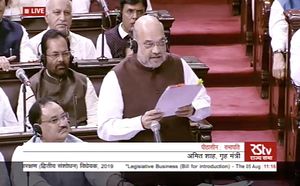After weeks and days of intense speculation about the situation in the Indian state of Jammu and Kashmir, the Modi government finally revealed its cards and in one fell swoop fundamentally transformed India’s relationship with the state. Home Minister Amit Shah announced in the Parliament the scrapping of Article 370, which exempted Jammu and Kashmir from the Indian Constitution (except Article 1 and Article 370 itself) and permitted the state to draft its own Constitution. The state will now be bifurcated into two Union Territories — Ladakh without a legislature, and Jammu and Kashmir with a legislature. While the government received support in the Parliament from parties like the BSP, AAP, BJD, and YSRCP, its ally the JD(U) walked out of the House in opposition to the move. Predictably, political leaders from the state called the move “unconstitutional” and warned of dangerous consequences.
In some ways, the move should not be that surprising as the BJP had talked of the abrogation of Articles 370 and 35 A in its 2019 manifesto and has never been shy of making its preferences clear on the matter. Syama Prasad Mookerjee, founder of the Bharatiya Jana Sangh, the predecessor of the BJP, was imprisoned by the Sheikh Abdullah government in Srinagar where he died in 1953, championing the cause of fuller integration of Jammu and Kashmir with India. Since then this issue has resonated with the rank and file of the party.
The Modi government’s strong mandate for a second term all but ensured that this issue would be front and center for its new agenda. For any government, this issue is a tinderbox, but Prime Minister Narendra Modi has time and again demonstrated his penchant for calibrated risk-taking. So the last few weeks saw the ground gradually being prepared for such a move, one which would have long term consequences for the country and could potentially be the high water mark of the Modi government, if managed carefully.
Elections are due in the state soon and it is important for India’s democratic credibility that elections take place in time. Meanwhile, the credibility of the so-called “mainstream” political parties in the state has hit rock bottom. While the separatist leadership has long been exposed for what it is – venal, self-serving puppets of Pakistan – it is the “mainstream” political actors in the state whose ineffective and corrupt malgovernance has hollowed the state out of any positive aspirations. And so for the Modi government the time was ripe to challenge the status quo.
The drama unfolding in the Afghanistan-Pakistan theater also provides an interesting backdrop to this development. U.S. President Donald Trump’s offer of mediation on Kashmir a few days back during Pakistani Prime Minister Nawaz Sharif’s visit to Washington might have convinced Indian policymakers that the time to make a move on Kashmir was now or never. If the United States and Pakistani interests converge on Kashmir at the expense of India, there is no reason why New Delhi should play ball. India has its equities to preserve in Afghanistan and at times playing the role of a spoiler is equally important to convey to your interlocutors that your voice matters. Modi’s move on Kashmir, whether planned or unintentional, does precisely that. Not only will the United States be struggling to figure out a response to this, but Pakistan will be under immense pressure to do “something” about it. So far Islamabad has slammed India’s move of revoking Article 370. Arguing that New Delhi’s unilateral move could not change the nature of the Kashmir dispute, it has suggested that Islamabad will exercise all possible options to counter India’s moves. This is likely to involve Pakistan raising the Kashmir issue at all possible fora, including at the forthcoming session of the UN General Assembly in September. Whether there will be any appetite for it in the international community is another matter altogether.
For many in India, too, this move will be difficult to digest. We have grown so used to the status quo that a change of this magnitude challenges our intellectual faculties. But it is also a reality that much as many of us would like to ignore, the status quo on Kashmir had became unsustainable long ago. It was only the political and policy inertia that kept Indian policymakers from challenging that. The so-called problem in Jammu and Kashmir has always been a bilateral matter between the people of the state and the rest of the country. The rest of India has been living with one set of policies vis-a-vis Jammu and Kashmir for the last almost seven decades and the results have been underwhelming. It is time now to change those policies. Just like the people of Jammu and Kashmir have a stake in the rest of India, the rest of India too has a stake in the state. The Modi government’s latest move underlines that it is not only serious about consolidating India’s frayed peripheries but is also cognizant of aspirations of a state that despite its resources has become a cesspool of violence and degenerative politics. For that doing away with the shibboleths of the past is a necessary first step.

































